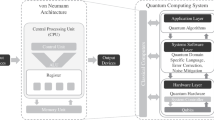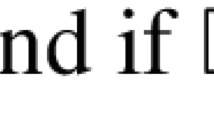Abstract
The characteristic holistic features of the quantum theoretic formalism and the intriguing notion of entanglement can be applied to a field that is far from microphysics: logical semantics. Quantum computational logics are new forms of quantum logic that have been suggested by the theory of quantum logical gates in quantum computation. In the standard semantics of these logics, sentences denote quantum information quantities: systems of qubits (quregisters) or, more generally, mixtures of quregisters (qumixes), while logical connectives are interpreted as special quantum logical gates (which have a characteristic reversible and dynamic behavior). In this framework, states of knowledge may be entangled, in such a way that our information about the whole determines our information about the parts; and the procedure cannot be, generally, inverted. In spite of its appealing properties, the standard version of the quantum computational semantics is strongly “Hilbert-space dependent”. This certainly represents a shortcoming for all applications, where real and complex numbers do not generally play any significant role (as happens, for instance, in the case of natural and of artistic languages). We propose an abstract version of quantum computational semantics, where abstract qumixes, quregisters and registers are identified with some special objects (not necessarily living in a Hilbert space), while gates are reversible functions that transform qumixes into qumixes. In this framework, one can give an abstract definition of the notions of superposition and of entangled pieces of information, quite independently of any numerical values. We investigate three different forms of abstract holistic quantum computational logic.
Similar content being viewed by others
References
Aharonov, D.: A simple proof that Toffoli and Hadamard are quantum universal (2003). arXiv:quant-ph/0301040
Aharonov, D., Kitaev, A., Nisan, N.: Quantum circuits with mixed states. In: STOC ’98: Proceedings of the Thirtieth Annual ACM Symposium on Theory of Computing, pp. 20–30. ACM, New York (1998)
Dalla Chiara, M.L., Giuntini, R., Freytes, H., Ledda, A., Sergioli, G.: The algebraic structure of an approximately universal system of quantum computational gates. Found. Phys. 39, 6 (2009)
Dalla Chiara, M.L., Giuntini, R., Leporini, R.: Logics from quantum computation. Int. J. Quantum. Inf. 3, 293–337 (2005)
Dalla Chiara, M.L., Giuntini, R., Leporini, R.: Compositional and holistic quantum computational semantics. Nat. Comput. 6, 113–132 (2007)
Dalla Chiara, M.L., Giuntini, R., Negri, E.: From quantum mechanics to music. Adv. Sci. Lett. 1, 169–178 (2008)
Gudder, G.: Quantum computational logics. Int. J. Theor. Phys. 42, 39–47 (2003)
Shi, Y.: Both Toffoli and controlled-Not need little help to do universal quantum computation (2002). arXiv:quant-ph/0205115
Author information
Authors and Affiliations
Corresponding author
Additional information
Dedicated to Peter Mittelstaedt.
Rights and permissions
About this article
Cite this article
Dalla Chiara, M.L., Giuntini, R., Ledda, A. et al. Entanglement as a Semantic Resource. Found Phys 40, 1494–1518 (2010). https://doi.org/10.1007/s10701-010-9407-5
Received:
Accepted:
Published:
Issue Date:
DOI: https://doi.org/10.1007/s10701-010-9407-5




